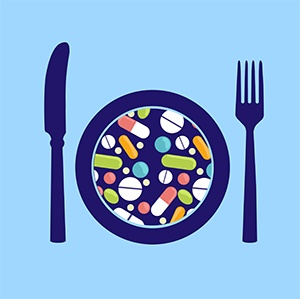

If you’re on Warfarin, you shouldn’t take aspirin or Ibuprofen as these medications could increase the risk of bleeding. You can take paracetamol, but you need to stick to the recommended dosages very carefully.
You should have regular blood tests when taking Warfarin in order to test your International Normalised Ratio (INR). If your INR is high, you have an increased risk of bleeding. If it’s too low, you have an increased risk of blood clotting.
Several foods can interfere with the working of Warfarin in your body. Doctors recommend that you don’t make any major changes to your diet when starting to take Warfarin. However, there are certain foods to avoid or limit.
Any foods that contain large amounts of Vitamin K can lessen Warfarin’s effectiveness, especially if not eaten in consistent weekly amounts. You don’t have to avoid these foods, but take care not to have a large amount of it in one week, and nothing the following week. These foods include green, leafy vegetables, like Brussels sprouts, spinach, broccoli and parsley.
Green tea has the same effect, as does cauliflower, cooked chickpeas, cooked lentils, beef liver and cooked soybeans.
These foods don’t have such a serious effect, but shouldn’t be eaten in great quantities, or irregularly:
- Cooked asparagus.
- Cooked green beans.
- Raw green onions.
- Lettuce.
- Cooked cabbage.
- Raw celery.
- Green apples.
- Pistachio nuts.
- Soybean oil.
- Rolled oats.
- Wheat bran.
- Wheat flour.
- Wheat germ.
- Chicken liver.
- Pork liver.
- Coffee.

These foods are low in Vitamin K. One cup of the foods of your choice can be eaten every day without having an effect on the effectiveness of the Warfarin you may be taking:
- Sweet corn (raw or cooked).
- Onions (raw or cooked).
- Pumpkin (cooked).
- Squash and butternut (cooked).
- Potatoes (cooked).
- Sweet potatoes (cooked).
- Aubergine (cooked).
- White mushrooms (raw or cooked).
- Tomatoes (raw or cooked).
- Cucumbers (raw).
- Iceberg lettuce.
Drinks that can increase the effect of Warfarin include cranberry juice and alcohol. It’s especially dangerous to binge drink while you’re taking Warfarin, as alcohol increases the effect of the warfarin, which means it could increase the risk of bleeding.
When you’re taking Warfarin, it’s essential to go for regular blood tests, to avoid foods that may be harmful, and to speak to your doctor or pharmacist before taking any over-the-counter medications.





 Publications
Publications
 Partners
Partners














